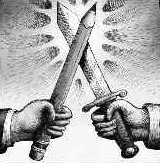Pedagogical Methodologies and Modifications

Abstract
“Theory is not inherently healing, liberatory, or revolutionary. It fulfills this function only when we ask that it do so and direct our theorizing towards this end.”†
According to the Wiki, “Education encompasses both the teaching and learning of knowledge, proper conduct, and technical competency. It thus focuses on the cultivation of skills, trades or professions, as well as mental, moral and aesthetic development.” To educate - the verb - enacts knowledge exchange from a position of moral and ethical value, and is beholden to “proper conduct” appropriate to the classroom environment.
Knowledge, in its most discrete and granular way, is power. As the site of pedagogical power transfer, educational institutions contain a vast array of personal, political, and social conditions which define the relationships between pedagogues and their students, and their exchange of knowledge and power. Beholden to formal demands for structure, these spaces of learning can simultaneously liberate and dominate. As byproducts of imperial domination, American pedagogical spaces can sometimes be volatile sites of engagements, conflicts, barriers, closures, crossings and openings.
In this paper, I suggest that a theoretical emphasis which fails to recognize and promote a praxis-oriented approach to social change will inevitably fail. Praxis then becomes the necessary articulation of an already theory-heavy approach to cultural transformation. The lack of balance between theory and praxis, more than a hallmark of inequity, also serves to reinforce confusion and disaffection in matters of race relations and pedagogical experiences. In discursive exchange with Henry Giroux, I speak of these pedagogical spaces; binaries, borders, and crossings. With bell hooks; holism, praxis, and liberation. And with Edward Soja, of the “trialectical”, or what hooks calls, “a space of radical openness”, a place of revolutionary pedagogy.
† ~ hooks, bell. Teaching to Transgress. London: Routledge, 1994, 61.
